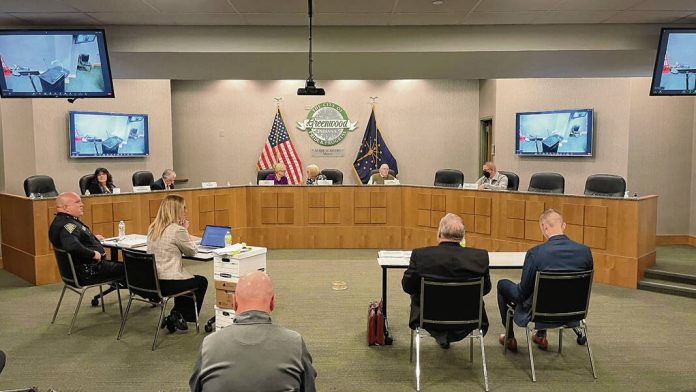A suspended Greenwood police officer’s fate is now in the hands of the city’s police merit commission after nearly four hours of testimony Wednesday.
Officer Sam Bowen, who is suspended without pay, is facing termination for allegedly violating three of the department’s policies: Information and Technology Use; Mobile Data Center Use; and Standards of Conduct. The Greenwood Police Merit Commission heard hours of testimony from witnesses supporting the police department and Bowen during his disciplinary hearing Wednesday evening.
A final decision on whether Bowen will be fired from the department will not be made until after the commission deliberates in an executive session on Thursday evening. The decision will be announced during the commission’s regular meeting that follows.
The charges
Disciplinary charges were filed against Bowen based on electronic communications compiled after Bowen filed a federal lawsuit against the city in June. In that lawsuit, Bowen is accusing Police Chief Jim Ison of depriving/conspiring to deprive him of his First Amendment right of Freedom of Speech based on posts made on Facebook before the May Municipal Primary and messages he sent to other officers.
Police officials have compiled a 5,320-page document containing instant messages sent and received by Bowen from July 14, 2021, to July 14 of this year. Within the document are over 100 exchanges between six officers that contain derogatory language that were sent on department equipment, according to the documents. The messages contained slurs referring to African Americans, Jewish people, the LGBT community and people with intellectual disabilities.

Selections of the messages were read off during Wednesday’s hearing. Among the messages were an anti-gay slur, and terms like “jew” and “13 percenter.” The last term refers to the percentage of the U.S. population that is African American and has been used to falsely suggest that they commit 50% of all crimes, officials testified.
Based on the messages, the six officers were interviewed in August. Three of the officers resigned before disciplinary charges could be brought and one officer is not up for termination. Bowen and Officer Elijah Allen were suspended and are facing termination because of the messages.
During Bowen’s disciplinary hearing Wednesday, the five-member police merit commission heard testimony from city and police officials about how the messages were obtained and why termination was recommended for Bowen. Beth Copeland, an attorney representing the police chief, told the commission in her opening statement that the only two questions before them were whether Bowen’s conduct violated policy and whether the violations warranted termination. The answer was yes to both, she argued.
“His conduct was so severe and pervasive, it cannot be tolerated,” Copeland said.
Jay Meisenhelder, Bowen’s attorney, said there was only one question before the commission: — whether the conduct warranted termination. Bowen admits what he said was wrong and a violation of policy, but he was trying to release some of the tension he experienced as an officer in stressful and discouraging situations through “what they felt at the time was humor,” Meisenhelder said.
Bowen’s conduct doesn’t merit termination, Meisenhelder argued.
“Discipline should be relatively proportional to the offense, and similar offenses should be punished similarly,” he said.
Meisenhelder also said the evidence he would present would show that Ison’s alleged motivation for Bowen’s termination was the continuation of a reprisal based on the fact he filed a lawsuit.
GPD’s case
City and police officials testified that they felt the messages were alarming and could undermine the public’s trust in the department.
After reading the messages, Assistant City Attorney Drew Foster — a former prosecutor and incoming city court judge — said he felt they could undermine an officer’s credibility in court.
“If you have conduct like this, that really challenges their credibility, the judge is gonna consider that,” Foster said.
Assistant Police Chief Matt Fillenwarth was tasked with interviewing the officers involved and recommended Bowen be terminated. Fillenwarth said it likely that people who are in one of the minority groups mentioned in the messages would wonder if they were treated fairly if Bowen arrests them in the future.
GPD is only effective if the community trusts and believes in them, Fillenwarth said. The messages violate that trust, he said.
“There’s gonna be that doubt,” he said. “If I’m one of those groups, there’s always going to be that doubt.”

Several questions were also asked about whether the department obtained messages from other officers. Bowen’s messages were pulled as part of the discovery process for the lawsuit — a normal part of the legal process, Foster said.
Ison later said he personally requested the messages from the other officers involved. He also randomly selected two officers from each shift during the same time period to have their messages pulled to see how big of an issue the conduct was, and whether it was systemic, he said.
“I did keyword searches using the same words and there was nothing,” Ison said. “So I was fairly confident that this was isolated to one faction.”
Commission member Tom Brogan asked Ison whether the department had looked into traffic stops and arrests performed by Bowen and the other officers involved to determine if there was any evidence of racial profiling. Ison said GPD did random pulls of reports from officers around the time the messages were sent, but they didn’t see any overt patterns leading them to believe there was profiling.
Greenwood Police has also hired a firm to do a comprehensive study of all arrests and traffic stops by all officers in the department over the last year to determine if profiling is a problem. It’s expected to take nine months to know the results, he said.
“I need to know, and the public is going to demand to know, if our officers are in fact profiling certain groups,” Ison said.
If the commission were to not terminate Bowen from the department, Ison said he would not let Bowen be put back into a role where he would interact with the public.
“I think that would be a liability for the city. … It would be an injustice to citizens we serve, so I don’t know what I would do,” he said.
Doneisha Posey, an attorney and legal expert on racial profiling, testified as to the effects of the messages. She testified that the messages and their surrounding scandal have damaged the reputation of the Greenwood Police Department.
The messages are also more than just words on a piece of paper, she said. They are public records that have been publicized, and anyone could know of them, Posey said.
“These are comments that truly hurt different demographics, folks that already feel underserved and under-valued by many systems, including the police force — not particularly this police force, but in general,” Posey said. “And so when you have comments like this, whether they are on paper or on a computer or said live, they’re still very hurtful, very egregious, very discriminatory.”
Bowen’s defense
When it came to Bowen’s defense, he was the only one to testify, although Ison was recalled during Meisenhelder’s questioning. When asked about the messages, Bowen said they were not something he was proud of.
“It’s not anything I’m proud of. It was, for me, humor between friends and a way to deal with stress,” Bowen said. “I think a lot of people in this police department can attest the past two years have been very difficult for Greenwood.”
Bowen also took issue with statements made that implied he was racially profiling. There were no instances of that, he said.
As for possible problems with past arrests he made, Bowen said there was not a single incident where he didn’t have his body camera on.
“At any point, somebody can go watch my bodycam and see how I actually interacted with the public, and they won’t find anything that proves I’m racial profiling, discriminating,” he said. “I was giving nothing but what the public of Greenwood deserves, and that was excellent service from their police department.”
About the “13 percenter” comments, Bowen said he was referring only to the reportedly 13% of people who commit crimes, not specifically Black people. It was not meant to be derogatory, he said.
“Do I mean, ‘This is a black person and I don’t like them?’ No, not at all,” Bowen said. “… I don’t feel that I’m having bias towards these people. It’s terms I wish I didn’t use.”
Social media posts made by Bowen during the primary election also came up, and both Bowen and Ison testified to their contents and the situation surrounding the posts. The posts are a major part of Bowen’s lawsuit against the city, and Meisenhelder spent a lot of time arguing that Bowen was being treated harsher than other officers because of it.
In the posts, Bowen reportedly said Ison was covering things up and lying about crime statistics. Bowen did not identify himself as a GPD officer on the posts or the profile.
Ison denied the allegations when asked by Meisenhelder.
“I’ll tell you without hesitation that I’ve never lied about a stat that I’ve provided to the media,” Ison said.
Ison was also asked about whether it was a difference of opinion. He responded by saying the department has a policy that prohibited what Bowen posted on social media, and he took action for the violation.
“It was undermining my office. It was jeopardizing my effectiveness as a leader within my agency and in the community,” he said.
The social media policy is not one of the policies cited for Bowen’s termination.
See the results of the merit board’s decision online tonight, in print Saturday.





